Saving on taxes by resorting to fake donations and deductions may soon be a thing of the past with the Income Tax Department now assessing income tax returns (ITRs) using Artificial Intelligence (AI). The department is currently conducting reassessments of a significant number of income tax returns. Specifically, it is placing emphasis on cases where taxpayers have claimed deductions for donations made to charitable trusts and political parties during the fiscal year 2019.
Under Section 80G of the Income Tax Act, individuals can claim deductions ranging from 50-100 percent for donations made to political parties and charitable trusts. This provision allows taxpayers to avail of tax benefits on their contributions to eligible organizations. The exact percentage of the deduction depends on the specific criteria outlined in the section and the nature of the donation. It is advisable to refer to the relevant provisions and consult with a tax professional or refer to the Income Tax Department's guidelines for detailed information on claiming deductions under Section 80G.
What is in these notices?
The notices issued by the Income Tax Department were done so under Sections 138 and 148(A) of the Act. In several cases, the notices were primarily focused on highlighting an incorrect deduction claimed by the taxpayer. However, for certain instances where a significantly higher amount of donation has been claimed, a reassessment notice has been sent by the department. These notices serve to review and reassess the accuracy of the claimed deductions and ensure compliance with tax regulations.
The reassessment of income tax returns can be conducted within specific timeframes depending on the income level of the taxpayer. For individuals earning above ₹50 lakh, reassessment can be carried out within a decade. On the other hand, for individuals earning less than ₹50 lakh, the reassessment window is limited to eight years. It's worth noting that returns related to transactions that occurred in the fiscal year 2018-2019 (filed under the assessment year 2019-2020) can be reassessed until March 31, 2029. This time limit provides the Income Tax Department with a defined period within which they can review and reassess the income tax returns of taxpayers.
How are returns assessed for details of donations?
The Income Tax Department employs various methods to distinguish between genuine and fraudulent donation claims. The computerization of returns plays a crucial role in cross-checking the information provided by charitable trusts or political parties in their tax returns with the donation details provided by individuals.
To initiate a reassessment notice, only an assistant commissioner or a deputy commissioner who possesses substantial evidence and reasoning to question potential tax evasion is authorized.
In the Union Budget of February 2019, a new requirement was introduced for charitable trusts to obtain a unique identification number. This mandate aimed to enhance transparency and accountability in the donation process. Starting from April 1, 2020, only donations made to charitable trusts with these identification numbers became eligible for Section 80G deductions.
To streamline the process and facilitate accurate reporting, the plan was to pre-fill Section 80G donation details in downloaded income tax return forms using data obtained from charitable trusts. However, due to the unexpected COVID-19 lockdown, the implementation of this measure was postponed.
How should assessees respond to such notices received?
When an individual receives a notice under Section 148(A), it is essential to respond appropriately. If the individual possesses the necessary evidence or proof of the donation claimed, they can provide it as a response to the notice. Submitting the evidence would help support the deduction claimed and establish the legitimacy of the donation.
However, if the individual does not possess the required proof of the donation or fails to provide it in response to the notice, they may be liable to pay the tax amount mentioned in the notice. Additionally, there may be penalties or other consequences as specified in the notice.
It is crucial to carefully review the notice, understand the specific requirements or allegations mentioned, and seek professional advice or assistance if necessary. A tax professional or legal expert can provide guidance on how to respond to the notice and navigate the reassessment process effectively.
Are there penalties involved?
In cases where an individual is unable to provide proof of a genuine transaction and is found to have evaded tax, penalties ranging from 50 to 200 per cent may be applicable. It is crucial to submit the necessary proof within 30 days of receiving the notice to avoid such penalties. Providing inaccurate or false information can also lead to penalties, including 50 per cent of the tax liability for under-reporting or 200 per cent of the tax for misreported income.
If an individual becomes aware that they have incorrectly claimed a Section 80G tax deduction without having received a notice from the Income Tax Department, they do have the option to rectify the situation by updating their tax returns. This can be done within a period of two years from the end of the relevant assessment year.
By updating their tax returns, the individual acknowledges the mistake and agrees to pay a higher amount of tax. Typically, this higher tax liability may range from 25 to 50 per cent more than what was initially claimed. The exact percentage increase will depend on the specific circumstances and applicable tax laws.
It is important to note that voluntarily correcting the error by updating the tax returns demonstrates compliance and integrity, which is generally viewed favourably by tax authorities. Seeking professional advice while updating the tax returns helps.
It is essential to carefully assess the circumstances, consult with a tax professional, and evaluate the potential risks and benefits before determining the best course of action.
